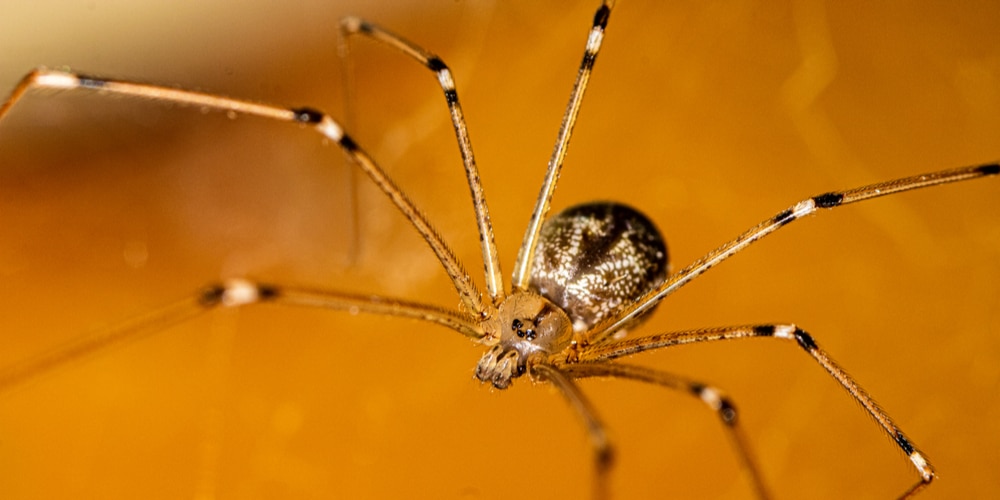Have you seen a long-legged spider (or maybe two) running across your floor or suspended in the corner of your basement? It isn’t surprising if you’ve seen one or more of these eight-legged creatures in your home, as they are quite common indoors. In fact, you may have seen many different kinds of spiders inside your house without even realizing it! You may also be wondering, ‘what do cellar spiders eat?’
These long-legged spiders that are commonly spotted in homes are cellar spiders, also known as daddy longlegs. Their long, thin legs are their most distinctive feature and can be twice the length of their small, round bodies.
Generally, cellar spiders have light brown or gray bodies, although their legs may be darker. They range in size from about 0.08 to 0.16 inches long, and their legs may span up to an inch. Male and female cellar spiders look very similar, but males are often smaller than females and have longer legs.
If you’re looking for more information on cellar spiders, including their diet, keep reading!
Where Can You Normally Find Cellar Spiders

In general, these spiders’ names are taken from their preferred habitats. For cellar spiders, this means that they are most often found in cellars or other damp, dark places such as crawl spaces, garages, and attics. Outdoors, they can be found beneath rocks, leaves, or logs.
Naturally, you’re more likely to see cellar spiders at home during the colder seasons. They often enter houses and other buildings in search of warmer temperatures and mates. Once they find their way indoors, they may overstay as long as there’s a food source and they’re left undisturbed.
What Do Cellar Spiders Eat?
These inconspicuous creatures are actually voracious eaters and will consume many different types of household pests.
Cellar spiders feast on insects such as flies, mosquitoes, moths, and ants. Although fragile-looking, they’re also known to feast on larger prey such as wolf spiders, house crickets, and earwigs.
Since they are known to eat so many different types of insects, many household owners don’t mind having them in their cellars. It’s a beneficial relationship for both parties – the spiders get a food source, and the homeowners have one less insect to worry about!
Cellar spiders build webs in the corners of rooms and other secluded places indoors. These webs are untidy, with long strands of silk radiating out from a central point. The spiders hang upside down in their webs and wait for insects to become entangled.
Once captured, they wrap their food with silk before eating. This is how they get to capture and eat prey larger than them.
Will Cellar Spiders Cause Problems When Found Indoors?
For the most part, cellar spiders are harmless to humans and will not cause any problems when found indoors. As mentioned above, many people who’ve realized what these spiders can do prefer to have them around the house because they help keep the insect population down.
While they are known to eat larger insects or spider species, they’re relatively harmless to humans. Once you’ve sighted these spiders, you’ll notice their fast movement, often used as a defense mechanism when they feel threatened.
Like other house spiders, they don’t aggressively bite humans, given that you don’t give them a reason to. Leaving them in your cellar and other dark, undisturbed places will usually be enough to keep them content.
How to Get Rid of Cellar Spiders Inside Your Home?
If you fear spiders or feel uncomfortable having them in your home, there are many methods of getting rid of them that won’t cause any harm.
One of the most common ways is to use a vacuum cleaner. Spiders, eggs, and webs can all be sucked up by the vacuum and disposed of easily. With it, you can release them outdoors. Alternatively, you can use a broom to sweep them up and dispose of them in the same manner.
If you want a more long-term solution, there are also many chemicals that can be used to kill spiders or prevent them from entering your home in the first place. These include aerosols, sprays, gels, and powders that can be found in most hardware stores.
Sealing cracks, reducing humidity, and limiting food sources are also effective in preventing cellar spiders from entering your home.
What do cellar spiders eat: Final Thoughts
Cellar spiders are often feared because of their appearance and reputation as aggressive eaters. However, they are relatively harmless to humans and can actually be beneficial in your household by feeding on other insects. Leaving them undisturbed gives you an instant pest control solution.
Otherwise, you can resort to traps, insecticides, or other similar methods of getting rid of them if you feel uncomfortable having them around.
Related Article: What Do Brown Recluse Spiders Eat?
